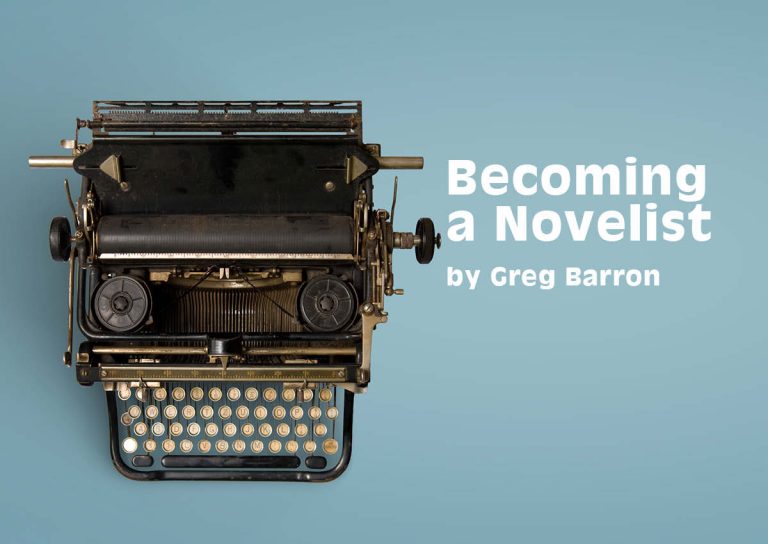When the offspring do the right thing – find employment and leave home – when careers wind down, and retirement beckons; many people look for a new activity to pass the time. Some feel a deep ambition to leave a lasting impression. Others who have loved books and stories all their lives, often start to think about writing a novel, getting it published, and becoming a novelist.
As you would expect, this is not as easy as it sounds, but with computers simplifying research and the writing process, finishing a book is challenging but achievable. The next stage, getting your work into the hands of readers, however, can be even more difficult.
So you still want to be a novelist? Here’s what you need to do.
Write a manuscript of publishable length
The minimum word count for a novel is 50 000 words, about the length of an average Mills and Boon romance. For most adult fiction genres, publishers won’t look at manuscripts of less than 65 000, with 90 000 being the sweet spot.
The key to reaching these seemingly impossible-sounding word counts is to set a daily goal and stick to it. 500 words per day should only take an hour or two, and in six months you’ll have a 90 000 word manuscript. You’ll need another three to six months to edit it, but that’s all part of the process.
If you plan to self-publish in digital formats, such as Amazon, Kobo and iBooks, you can throw publishers’ minimum word counts out the window. Digital is different to print. Many writers are self-publishing 20 – 30 000 word novellas, delighting readers and making money. More about digital options later.
Read Widely
Of course you read fiction every day because you love reading, but make sure you seek out the very best writers in the genre you’re working in: the most worthwhile lessons on craft are found in their books. Great novels also serve to remind you how high the standard is. This is important, but you’d be surprised at how many beginning writers claim that they don’t have time to read.
Most successful novelists not only write every day, but read as well. There is no such thing as not having time to read, you just have to adjust some priorities.
Learn the Craft of Writing
You can’t become a mechanic without a thorough understanding of how an engine works; of tools and techniques. Don’t expect to write a good novel without learning how to write.
Some people, such as English teachers and journalists, will require less work on tradecraft than others, but some fabulous books, admittedly more in the autobiographical genre than fiction, have come from men and women of vast life experience and very little schooling. Henri Charrière’s Papillon is a great example, as is AB Facey’s A Fortunate Life.
Do you understand the basics of point-of-view and tense? Do you know how and when to use commas, dashes, semi-colons and colons? If not, you’ll need to get your hands on some “how to write” books or even enrol in a course.
Most importantly you need to be able to write clear, coherent sentences. Your dialogue has to sound real. You need to be able to create a stunning premise, invent great characters, and develop the action so that it feels inevitable.
Revision is the key: multiple drafts. Novels often need major restructuring. Exhaustive line-by-line editing is essential. Sometimes it’s necessary to change the tense or point of view for part or all of a novel. Sometimes you have to start all over again.
“Following your writing dream takes passion, persistence, determination and a lot of hard work, but it is achievable if you make the commitment.” Annie Seaton (Australian author – latest book Undarra.)
Join a Writers Group
Most areas have excellent writer’s groups. Think of these as a support group. Your partner will probably not understand your anguish when the action in Chapter Fourteen just doesn’t seem convincing enough, but these people will.
Writer’s Groups are usually affiliated with state and territory writers’ organisations, and provide details of competitions, courses and issues affecting the business of writing. A quick search online will usually help put you in touch with the right people.
Research the Market
You need to understand who is likely to read your book, and why.
Most people read for entertainment, so you need to provide value. At the very least readers expect a piece of work that is carefully crafted and well-considered, featuring characters that they care about from start to finish. Also, readers of specific genres have high expectations. They hate derivative stories or pale imitations. It’s up to you to deliver something better.
Like every aspect of our culture, fiction publishing is subject to trends. While the best policy is always to write the kind of book you love to read, it’s still worth studying the latest bestseller lists. The hottest property in Australia right now is the rural crime genre, spawned by Jane Harper’s excellent The Dry. Good crime novels always sell. Rural Romance has now been selling well for two decades, and shows no sign of tailing off. Women’s fiction books regularly top the charts, while traditionally big-selling-genres such as thrillers don’t always do as well as they used to.
The romance genre is probably the biggest success story of the e-book revolution, with up to half of all sales having now migrated to Kindle, iBooks and Kobo. Historical novels still have a strong market, with Australian authors such as Nicole Alexander and Peter Watt nudging the charts with annual new releases.
If your tastes are more refined, and you’d prefer to write something poetic and character driven, then literary styles can sell well in Australia. You might just be the next Tim Winton or Richard Flanagan.
Alternatives to fiction?
Fiction might not necessarily be the best way to tell your story. Narrative non-fiction and biography use many of the same techniques as fiction, and might suit your ideas better.
If you are basing your story on a real-life historical figure, for example, you might prefer to stick to the facts and write a non-fiction book. Writers like Peter Fitzsimons and David Hunt are selling big numbers of books that include dialogue and “colour”, techniques that were previously more in the toolkit of the novelist.
“I judge unpublished manuscripts for contests sometimes and one thing I see in newbie writers is that they are following ALL the rules to the detriment of their unique voice. You need to know the so-called rules and then not be afraid to break them well.” Rachael Johns, (Australian author – Latest book Lost Without You)
Self-publishing and other options
It’s not all about major print publishers these days. It takes less than an hour to transform a Word document into a Kindle book and put it up for sale on Amazon. The very ease of this process means that there is plenty of dross out there, but the best books on Amazon rise to the top of the rankings, making it easy for people to find them.
The other game changer has been print-on-demand publishing, whereby books can be printed using automated machines, rather than offset printing presses, where the minimum print run was five hundred copies or more. Now it’s possible to order just one copy of a book, for the same unit price as one hundred. Even big publishers now use this process to keep low-demand titles in print.
Self-publishing is not for everyone. You need a strong skill set in writing, computer software, design and marketing, and you also need to project-manage any outsourced tasks such as editing or cover design.
So-called vanity publishing, or subsidised publishing, offers some of the advantages of traditional publishing, but is open to anyone, as long as you can stump up the substantial fees. A good vanity publisher will handle everything, including editing, cover design and even publicity.
Accept that rejection is part of the process
If you are determined to go down the traditional publishing route you must accept that rejection is part of the process. Your first (second, or third) book may not get published at all. In Australia, only about ten to twenty brand-new authors get a contract with a major publisher each year.
Hating on publishers when they reject you, either privately or publicly, is a futile exercise. When your book is rejected they are simply saying “I don’t think we can sell enough copies of this book to make it a viable proposition.” Often they’re right, sometimes not. Try to understand why they don’t think it’ll sell. Maybe it’s the work itself, maybe they think you need a better social media platform. You might also be writing in a ‘dud’ genre. A form email won’t tell you much, but you should be able to find something encouraging in any personal rejection – some small constructive gem that you can build on.
“Often writing a novel feels impossible, but I am proof that it IS possible.” Favel Parrett (Australian author – latest book There Was Still Love.)
Write because you love it
Write because you love it. No one can ever take that away from you. Do it every day and find an audience where you can. That might mean reading poems to your local writers’ group. Writing is special, being a writer is special. Be proud of what you do. Self-publish, publish online, but find your audience somewhere. Keep submitting to publishers. Sooner or later they might be looking for exactly what you are writing.
Is it all worth it?
As someone who has been through most of the highs and lows of a published author’s life, this takes some thought. I’ve had the thrill of the big three-book deal with a major publisher, I’ve had all-expenses paid lunches, been fussed over at head offices and sat on panels at writers festivals from Yeppoon to Sydney. I’ve also been dumped, ignored, criticised and had novels rejected many, many times.
Overall though, the answer, for me, is yes, it is all worth it. Having a novel published is a huge thrill, whether self-published or with a major publisher. But more than that, the process of writing is intrinsically rewarding. I know for a fact that I’m a better person because I write.
Good luck with your writing journey. Perhaps one day I’ll see you at one of those writers’ festivals.
Greg Barron is an Australian author, published by HarperCollins, and his own small press, Stories of Oz Publishing. Find out more at storiesofoz.com






1 Comment
Pingback: 5 on the fly: great recent Australian novels to get lost in - Go55s